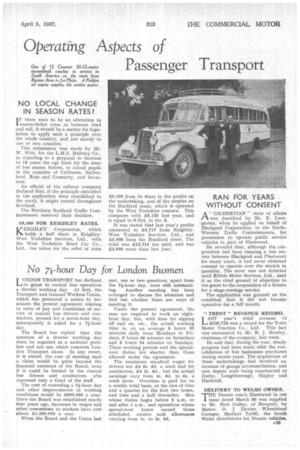No 7i-hour Day for London Busmen ONDON TRANSPORT has declined
Page 51

If you've noticed an error in this article please click here to report it so we can fix it.
to grant to central bus operatives a shorter working day. At first, the Transport and General Workers Union, which has presented a notice to terminate the present agreement relating to rates of pay and conditions of service of central bus drivers and conductors, pressed for a seven-hour day; subsequently it asked for a 7i-hour day.
The Board has replied that the question of a shorter working day must be regarded as a national problem and not one which concerns London Transport alone. In any event, it is stated, the cost of meeting such a claim would be quite beyond the financial resources of the Board, even if it could be limited to the central bus drivers and conductors, who represent only a third of the staff.
The cost of conceding a 71-hour day and other improvements in working conditions would be 2600,000 a year. Since the Board was established nearly four years ago, increases in wages and other concessions to workers have cost about £1,000,000 a year.
When the Board and the Union last
met, one or two questions, apart from the 71-hour day, were still outstanding. Another meeting has been arranged to discuss the situation and find out whether there are ways of meeting it.
Under the present agreement, the men are required to work an eighthour day, but, with time for signing off and on, etc., the actual working time is, on an average 6 hours 32 minutes daily from Mondays to Fridays, 6 hours 38 minutes on Saturdays and 6 hours 34 minutes on Sundays. These working periods and the spreadover duties are shorter than those allowed under the agreement.
The maximum standard wages for drivers are 24 8s. 6d. a week and for conductors, 24 3s. 6c1., but the actual earnings vary from 4s. 6d. to 6s. a week more. Overtime is paid for on a weekly total basis, at the rate of time and a quarter for the first two hours, and time and a half thereafter. Men whose duties begin before 5 a.m. or end after 1 a.m., and operatives whose spread-over hours exceed those scheduled, receive cash allowances varying from is. to 2s. 6d.




















































































